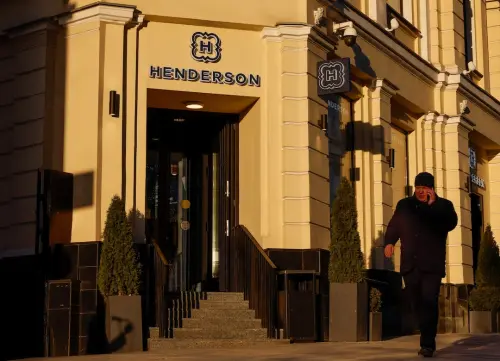In Moscow on February 26, Washington's efforts to swiftly resolve the conflict in Ukraine have triggered speculation about a potential return of Western brands to Russia. However, various markets, from fashion to automotive, have become more competitive compared to three years ago.
As Ukraine faced Russian troops crossing its border, U.S. President Donald Trump suggested the conflict could conclude within weeks, though the resolution remains uncertain.
To facilitate a substantial return of companies, Western sanctions impacting payments and trade would likely need to be eased. Those that do return will find a landscape where local or Chinese brands now dominate.
Henderson, a men's clothing chain that went public on the Moscow Exchange in late 2023, experienced growth due to the departure of foreign retailers, resulting in access to prime retail locations within shopping centers.
The shift has accelerated the company's sales, outpacing the average 8% annual growth in the men's fashion market, despite the continued presence of some Western brands.
Regarding the market dynamics, a spokesperson from Henderson mentioned, "The majority of foreign brands did not exit but rather adapted sales channels, either through local multi-brand stores or by rebranding their stores and introducing new trademarks."
Though consumer goods are not under sanctions, many companies ceased operations, leading to a legal route through third countries to sell foreign products without the trademark owner's consent.
The prime locations in shopping malls, once held by Western flagship stores, are now occupied by Russian competitors, with intense competition for these spaces.
While Moscow may not readily welcome back foreign brands, President Vladimir Putin stated a preference for Russian manufacturers if international companies return.
Expectations are high that several Western firms may return by the second quarter of the year according to Kirill Dmitriev, Putin's special envoy on international economic and investment cooperation.
Following the conflict in Ukraine, over a thousand Western companies withdrew from Russia due to various reasons, impacting the retail sector, which still sees 20% fewer visitors than in 2019.
Meanwhile, Russian consumers have embraced local brands, with increased sales reported by retailers like Stockmann. Moscow residents have attested to the quality and availability of domestic products, indicating a shift away from Western brands.
Though Western companies are currently hesitant to re-enter the Russian market, local brands are prepared to defend their market share and compete effectively.
In conclusion, consumer choice is central, as highlighted by Moscow resident Laysen Faskhutdinova, who stated, "I'd rather they return. Russians should have a choice."
